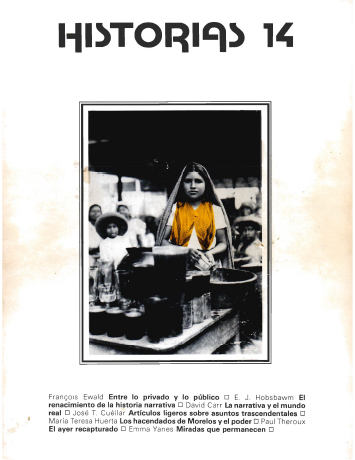La narrativa y el mundo real: un argumento en favor de la continuidad
Keywords:
Corrientes historiográficas, Narración, Teoría de la HistoriaAbstract
¿Qué relación hay entre una narración y los hechos que describe? Esta es una de las preguntas que han debatido muchos de los participantes en la intensa discusión interdisciplinaria sobre la narrativa en años recientes. El debate tiene que ver con la veracidad, en el sentido más amplio del término, de las explicaciones narrativas. Las historias narrativas tradicionales pretenden contarnos lo que realmente sucedió. Las narraciones ficticias retratan hechos que desde luego por definición jamás ocurrieron, pero de las cuales se dice a menudo que son más reales que la vida; es decir, cuentan cómo podrían haber sucedido ciertos hechos si en realidad se hubieran dado.
Downloads
References
Tomado de History and Theory. Studies in the Philosophy of History.
Louis O. Mink, "Narrative Form as a Cognitive Instrument" en The Writing of History, editado por R.H. Canary y H. Kozicki (Madison, 1978), 145.
Mink, "History and Fiction as Modes of Comprehension", New Literary History 1 (1970), p. 557.
Hayden White, "The Value of Narrativity in the Representation of Reality", en On Narrative, editado por W.J.T. Mitchell (Chicago, 1981), p. 4.
Ibid., 28.
Frank Kermode, El sentido de un final. Estudios sobre la teoría de la ficción, España, Editorial Gedisa, 1988, p. 43.
Ibid., p. 46.
Seymour Chatman, Story and Discourse: Narrative Structure in Fiction and Film (Ithaca, 1978), p. 47.
Roland Barthes, "lntroduction a l'analyse structurale des récits", Communication 8 (1966), p. 7.
Paul Ricoeur, Temps et récit (París, 1983), I, 113.
Ibid., p. 14.
Ibid., p.102.
Ibid.,
Ibid., p. 11.
Ibid., p. 13. Ver La Métaphore vive de Ricoeur (París, 1975), 305.
Temps et récit, p. 101.
Ibid., p. 67.
Para un recuento más detalladamente crítico del libro de Ricoeur véase mi reseña-ensayo en History and Theory 23 (1984), pp. 357-370.
En un artículo reciente, "The Question of Narrative in Contemporary Historical Theory", History and Theory 23 (1984), 1-33 pp., el mismo White hace un recuento mucho más amplio de estos mismos desarrollos que yo he tratado aquí. En cuanto a la presentación hecha por White, que es aparte un modelo de academicismo y síntesis, yo tengo tres observaciones: al parecer la modestia le impidió al autor documentar su propio e importante papel en los desarrollos que describe; por lo general aprueba las corrientes que yo critico; y no tiene, creo yo, bien expuesta la postura de Ricoeur, tal vez porque no consiguiera Temps et récit.
Barbara Hardy, "Towards a Poetics of Fiction: An Approach Through Narrative" en Novel (1968), p. 5 y ss.; y Tellers and Listeners: The Narrative Imagination (Londres, 1975); Peter Munz, The Shapes of Time (Middletown, 1977); Frederick Olafson, The Dialectic of Action (Chicago, 1979). Algunos teóricos alemanes han enfatizado la continuidad de la experiencia y la narrativa. Ver Wilhelm Schapp, In Geschichten Verstrickt (Weisbaden, 2a ed., 1979); Hermann Lübbe, Bewusstsein in Geschichten (Friburgo, 1972); Karlheinz Stierle, "Erfahrung un narrative Form" en Theorie und Erzählung in der Geschichte, editado por J. Kocka y T. Nipperdey (Munich, 1979), p. 85 y ss.
Kermode, p. 52.
Edmund Husserl, The Phenomenology of lnternal Time-Consciousness, trad. de J. S. Churchill (Bloomington, 1964), p. 40 y ss.
Maurice Marleau-Ponty, The Phenomenology qf Perception, trad. de C. Smith (Nueva York, 1962), p. 3 y ss.
Alasdair MacIntyre, After Virtue (Notre Dame, 1981), p. 197.
Hayden White, "The Structure of Historical Narrative", Clio 1 (1972), p. 12 y ss.
Arthur Danto, Analytical Philosophy of History (Cambridge, 1965), p. 12 y ss.
Mink, "History and Fiction as Modes of Comprehension", p. 557 y ss.
Robert Scholes y Robert Kellogg, The Nature of Narrative (Nueva York, 1966), p. 240 y ss.
Martín Heidegger, Being and Time, trad. de J. Marcquarrie y E. Robinson (Nueva York, 1962), p. 99.
Alfred Schutz, The Phenomenology of the Social World, trad. de G. Walsh y F. Lehnert (Evanston, 1967), p. 61.
MacIntyre, p. 191.
Ver Ernst Gellner, "Explanation in History", en Modes of Individualism and Colectivism, editado por J. O'Neill (Londres, 1973), p. 251; y Anthony Quinton, "Social Objects" en Proceedings of the Aristotelian Society 76 (1975-76), p. 17.
Jean-Paul Sartre, Critique de la raison dialectique (París, 1960), I, p. 391 y ss.
G.W.F. Hegel, Phenomenology of Spirit, trad. de A. V. Miller (Oxford, 1977), p. 110.
Los temas de este ensayo están desarrollados con más amplitud en mi libro Time, Narrative, and History, que en 1986 saldrá publicado por la Indiana University Press.



